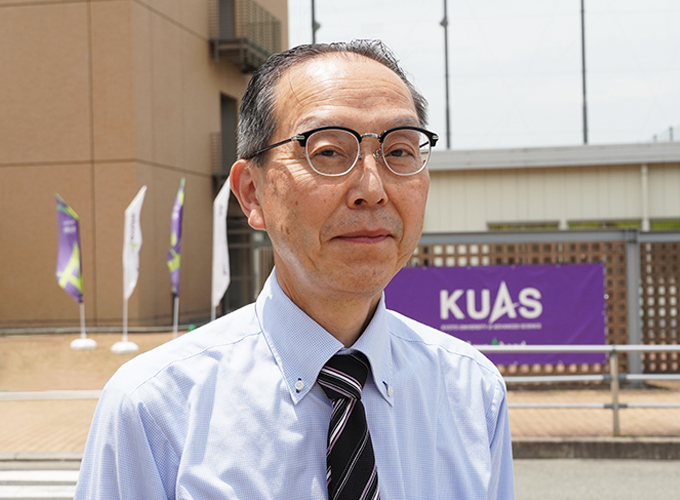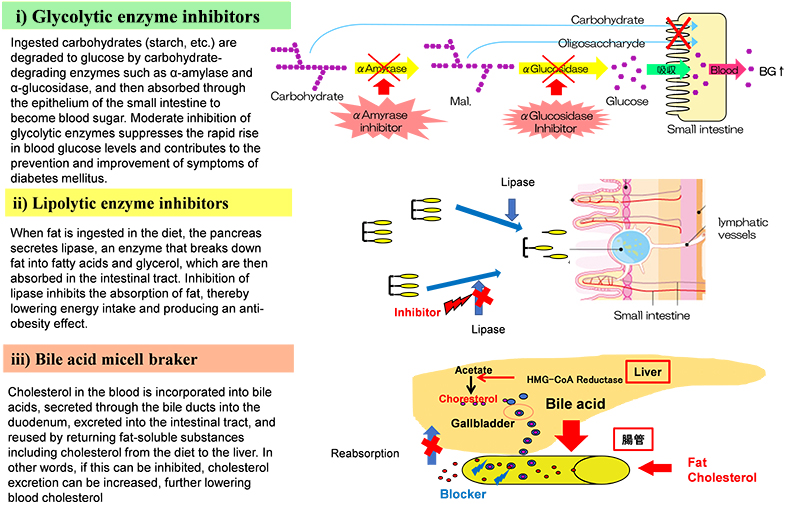Hiroyuki Fujita
Professor, Ph.D. in Agriculture
- fujita.hiroyuki

- Areas of Research
- Food Chemistry, Food Function, Food Analysis, Pharmacology
- Profile
- Research
-
Dr. Hiroyuki Fujita graduated from the Faculty of Applied Biological Science at Hiroshima University, where he studied Enzyme Chemistry. He then worked as a researcher at Fuji Spinning Corporation’s Research Institute for Product Development. In that research, he used chemically modified chitin and chitosan materials to study resins that can separate specific components and base materials that can gel oils and fats.
He also worked as a researcher as well as the General Director at Nippon Synthetic Chemical Co.’s Central Research Laboratory (Research Development Department, Nippon Supplement Inc., Ltd.). During this time, he was dispatched to Kyoto University’s Faculty of Agriculture, where he conducted research for three years for research.
He has worked on food functionality ranging from basic research, such as in vitro to in vivo experiments, to applied research for human clinical trials.
He also developed products and studied a series of processing steps from the extraction of food materials, purification of active ingredients and commercialization. Finally, he commercialized “Food for Specified Health Uses” (in particular, food for high blood pressure and food that slows carbohydrate absorption. ).Dr. Fujita’s profile is also available at: https://researchmap.jp/h-fujita
-
Dr. Fujita’s research is mainly conducted in two research areas: (1) investigating food functions, and (2) cohort study on the elderly in Kyoto-Kameoka-Study.
(1) It is understood that food products have three functions: Primary function, which are nutritional functions. Secondary function, or palatable functions such as taste and smell. And tertiary function, which are biological regulatory functions, such as conditioning the body. Among these, Professor Fujita’s research is focused on tertiary function.
Those who make food products are allowed to label the functions of foods and the specified health effects that can be achieved (i.e., helpful for maintaining and promoting health), such as “Helps maintain good GI condition” or “Slows fat absorption.” However, Dr. Fujita’s laboratory focuses on foods that are effective in improving or preventing lifestyle-related diseases such as hypertension, diabetes, and dyslipidemia. Such lifestyle-related diseases are caused by a variety of factors, but the ultimate goal is to develop foods that can contribute to improving one’s lifestyle.
For example, if one has high blood pressure, it would be imperative to search for foods that can suppress the effects of hormones that are raising blood pressure and dilating arteries. To control diabetes and obesity, one would need foods that inhibit enzymes involved in the absorption of carbohydrates and lipids. For blood glucose count in particular, one needs substances that inhibit α-amylase and α-glucosidase involved in the absorption of carbohydrates, and DPP-IV inhibitors involved in insulin secretion. And for anti-obesity effects, foods that can inhibit the accumulation of fat droplets using fat cells are needed.
Dr. Fujita obtained a portion of his research results from a joint study with Miyazaki University. In this study, he investigated the physiological function of blueberry leaf extract being developed at the university. He found that the extract potently inhibits amylase. Furthermore, through an experiment conducted on rats, he was able to confirm that the blueberry leaf extract was able to suppress the increase in blood glucose levels caused by starch ingestion. On the other hand, the extract was also found to exhibit potent arterial relaxant activity, although this was proved to significantly lower blood pressure in spontaneously hypertensive rats.(2) In collaboration with Kameoka City and the National Institute of Health and Nutrition, Dr. Fujita also conducts a cohort study of elderly people in Kameoka City. This collaborative study examines the causal relationship between nutrition, exercise habits, frailty, death, etc. through questionnaire surveys, physical fitness measurements, and nutritional guidance.
So far, Dr. Fujita’s research clarified the causal relationships between frailty and frequency of tea drinking, protein intake, and others.As described above, through food from a human perspective, Dr. Fujita is conducting research from both a micro level, such as physiological function, and a macro level.
